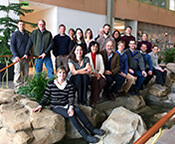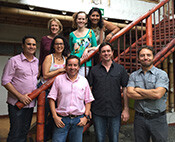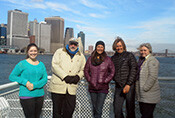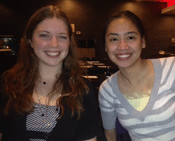Climate change and moose in the North Woods of the Northeast United States
 Bill Dennison and Brianne Walsh traveled to Westborough, Massachusetts for a science synthesis workshop on drivers of moose, climate change, and forest structure in the North Woods of the Northeastern United States. The workshop was the first in the series aiming to apply scenario planning as a management tool in the North Woods of the U.S. In partnership with the Wildlife Conservation Society and the USGS National Climate Change and Wildlife Science Center, IAN is working to produce a 4-page workshop newsletter, as well as science communication synthesis materials as the project progresses.
Bill Dennison and Brianne Walsh traveled to Westborough, Massachusetts for a science synthesis workshop on drivers of moose, climate change, and forest structure in the North Woods of the Northeastern United States. The workshop was the first in the series aiming to apply scenario planning as a management tool in the North Woods of the U.S. In partnership with the Wildlife Conservation Society and the USGS National Climate Change and Wildlife Science Center, IAN is working to produce a 4-page workshop newsletter, as well as science communication synthesis materials as the project progresses.
Our first report card in South America - The Orinoco River Basin, Columbia
 IAN is venturing into South America as part of a fantastic new partnership with World Wildlife Fund. Simon Costanzo headed to Cali, Colombia, to plan report cards for three Colombian tributaries of the Orinoco River – the Meta, Bita and Guaviare Rivers. The 1,330 mile long Orinoco River is considered to be the third most important river system in the world with a watershed of 340,000 sq mi spanning Colombia and Venezuela and discharging into the Atlantic Ocean. These three report cards represent a pilot of a standardized approach, that if successful will be expanded to other WWF priority rivers around the world, such as the Mekong River in Cambodia. Stakeholder workshops in May and July 2015 will formally kick off the report card development in Colombia, with release planned for early 2016.
IAN is venturing into South America as part of a fantastic new partnership with World Wildlife Fund. Simon Costanzo headed to Cali, Colombia, to plan report cards for three Colombian tributaries of the Orinoco River – the Meta, Bita and Guaviare Rivers. The 1,330 mile long Orinoco River is considered to be the third most important river system in the world with a watershed of 340,000 sq mi spanning Colombia and Venezuela and discharging into the Atlantic Ocean. These three report cards represent a pilot of a standardized approach, that if successful will be expanded to other WWF priority rivers around the world, such as the Mekong River in Cambodia. Stakeholder workshops in May and July 2015 will formally kick off the report card development in Colombia, with release planned for early 2016.
IAN in The Big Apple!
 IAN traveled to New York City on February 9-13 for the Curriculum and Community Enterprise for New York Harbor Restoration in New York City Public Schools project. This NSF-funded project, co-led by PACE University's School of Education and the Billion Oyster Project, aims to deliver environmental restoration education to New York City public schools. IAN is developing a digital platform that will allow students and teachers to access and analyze real time water quality data, view progress of restoration efforts, and create and access new curriculum. As part of the site visit, the IAN team met with the project partners and were introduced to the teachers who will participate in the first year of the fellowship program. The visit also included a ferry ride to Governor's Island to visit the offices of the Billion Oyster Project, and tour the New York Harbor School, as well as a visit to the New York Aquarium. IAN members involved in the project include Bill Dennison, Simon Costanzo, Tracey Saxby, Adrian Jones, Judy O'Neil, and Suzi Spitzer.
IAN traveled to New York City on February 9-13 for the Curriculum and Community Enterprise for New York Harbor Restoration in New York City Public Schools project. This NSF-funded project, co-led by PACE University's School of Education and the Billion Oyster Project, aims to deliver environmental restoration education to New York City public schools. IAN is developing a digital platform that will allow students and teachers to access and analyze real time water quality data, view progress of restoration efforts, and create and access new curriculum. As part of the site visit, the IAN team met with the project partners and were introduced to the teachers who will participate in the first year of the fellowship program. The visit also included a ferry ride to Governor's Island to visit the offices of the Billion Oyster Project, and tour the New York Harbor School, as well as a visit to the New York Aquarium. IAN members involved in the project include Bill Dennison, Simon Costanzo, Tracey Saxby, Adrian Jones, Judy O'Neil, and Suzi Spitzer.
IAN staff join MEES PhD program
 Vanessa Vargas is starting in the MEES PhD program this spring semester with Bill Dennison as her advisor. She has been with IAN since March of last year and she is looking to incorporate her work on the Mississippi River report card and Behavior Change Impacts Assessment in her research. She is interested in the report card development process, in developing and assessing different indicators that can effectively translate science into management guidelines. Currently, Vanessa serves as the Teaching Assistant for the MEES 698Y: Science for Environmental Management course co-taught by Drs. Don Boesch and Bill Dennison. Suzi Spitzer joined IAN in August as a Science Communication Intern in the Annapolis Office. She is starting in the MEES PhD program this month, and will be studying with Bill Dennison. Suzi is interested in looking at anthropogenic impacts on coastal systems (positive and negative!) and her research will involve both science communication and ecology. She hopes to investigate how citizen science can be used to effectively inform, engage, and inspire different audiences outside of academia.
Vanessa Vargas is starting in the MEES PhD program this spring semester with Bill Dennison as her advisor. She has been with IAN since March of last year and she is looking to incorporate her work on the Mississippi River report card and Behavior Change Impacts Assessment in her research. She is interested in the report card development process, in developing and assessing different indicators that can effectively translate science into management guidelines. Currently, Vanessa serves as the Teaching Assistant for the MEES 698Y: Science for Environmental Management course co-taught by Drs. Don Boesch and Bill Dennison. Suzi Spitzer joined IAN in August as a Science Communication Intern in the Annapolis Office. She is starting in the MEES PhD program this month, and will be studying with Bill Dennison. Suzi is interested in looking at anthropogenic impacts on coastal systems (positive and negative!) and her research will involve both science communication and ecology. She hopes to investigate how citizen science can be used to effectively inform, engage, and inspire different audiences outside of academia.
On the Horizon . . .
- A new course, Communicating Science Effectively, will be offered by the Integration and Application Network in fall semester 2015. This course will focus on developing effective strategies for communicating scientific findings using a variety of data visualization tools, including conceptual diagrams, informative maps, photographs, and video clips. This 3-credit course will be offered through the University of Maryland Marine, Estuarine, Environmental Sciences graduate program. Please stay tuned for registration information!
- IAN staff will be attending River Rally 2015, a gathering of the River and Watershed Conservation Community, in Santa Ana Pueblo, New Mexico May 1-4.

